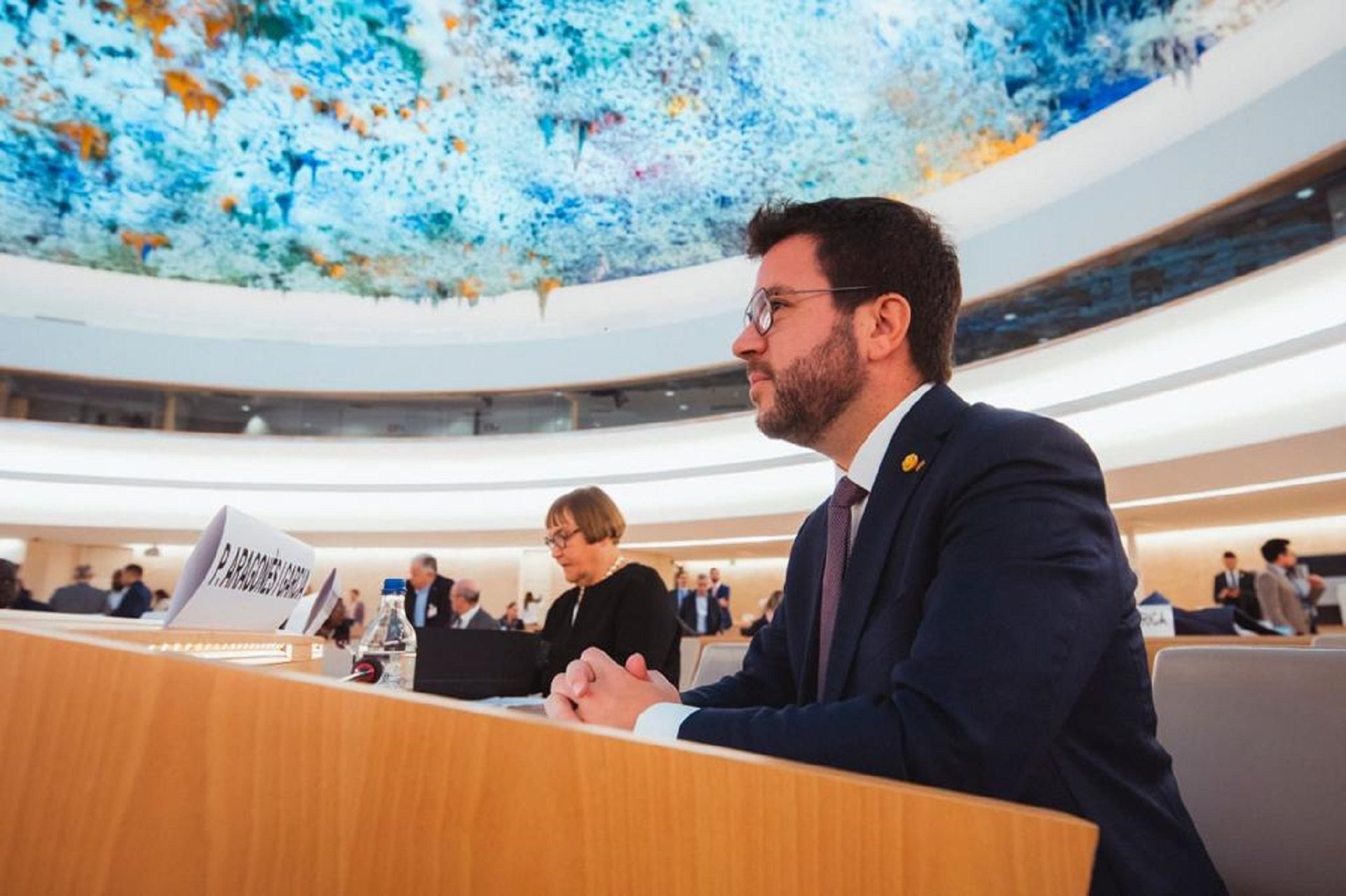The alert over the situation of the Catalan language was heard this morning in the emblematic Human Rights and Alliance of Civilizations Room, at the United Nations building in Geneva. The president of Catalonia, Pere Aragonès, appeared before the annual meeting of the Forum on Minority Issues to convey the concern for the future of Catalan, and denounce Spain's strategy to minoritize the language, in a process of political recentralization and national, cultural and linguistic assimilation.
Under the dome designed by Mallorcan artist Miquel Barceló, popularly known as the Sistine Chapel of the UN, Aragonès began his speech by explaining that Catalonia is a "modern, advanced and prosperous nation" and "a European nation open to the world", in which Catalan culture and language play a central role in promoting social the cohesion of the country.
"We are taking part in this forum as a stateless nation with the desire to share with you the concern for the future of the Catalan language and how in all fields we must contribute to preserving linguistic diversity and ensuring that everyone can live fully and normally using their own language", he declared, first in Catalan and then in English.
The United Nations Forum on Minority Issues is a body created by the UN Human Rights Council in 2007, meeting once a year, with the aim of providing a platform that promotes dialogue and cooperation on issues affecting national, religious and linguistic minorities.
Minoritized language
In a seven-minute speech, Aragonès explained that Catalan has ten million speakers and for this reason it is not a minority language but rather a minoritized language - whose usage is becoming marginalized - with the exception of the microstate of Andorra, where Catalan has full official status. By contrast, it has not obtained the recognition or the protection it deserves in Italy, France or Spain.
Aragonès explained Catalonia's linguistic experience and how its autonomous government took advantage of the recovery of its own institutions, with limited sovereignty, to stop the substitution of the Catalan language by Spanish from the 1980s on, a situation that also affects the Valencian Country and the Balearic Islands, within a "conscious process of [Spain's] political and economic recentralization and national, cultural and linguistic assimilation".
The Spanish ambassador to this body, Aurora Díaz-Rato, received Aragonès at the headquarters of the United Nations. However, Catalan government sources verified how he left the room when the president took his place at the speaker's table. In the subsequent debate, the Spanish delegation did not take part.
During the address, Aragonès recalled that since the post-Franco recovery of democracy and the institutions of self-government, Catalonia has deployed its language policies within the Spanish constitutional framework, which have contributed to advances in the use of the language. He explained that the Catalan government's language policy is inspired by three central ideas: firstly, the conviction that Catalonia has an open and plural society and a cohesive society into which people from all over the world can integrate; secondly, he asserted the principle of subsidiarity which must allow the preservation of all languages in a globalized world, to protect, regardless of mother tongue, the equality of rights and the linguistic diversity of humanity; and thirdly, he referred to what he described as the challenges of multilingualism, "the defence and consolidation of one's own language is not incompatible with the recognition, learning and use of other languages".
In conclusion, he synthesized all these ideas into what he has described as "good practices in language policies" such as: the use of the Catalan language in place names, institutions and the media in Catalonia; multiple official status, given that Catalonia has three official languages, Catalan, Castilian and Aranese; the accompaniment of newcomers in the learning process by offering them linguistic services; an educational system that promotes the use of the Catalan language and aims at multilingualism for all students; and the special application of all these principles for the Aranese language, the language spoken in the Pyrenean county of Val d'Aran.
ERC meeting with Marta Rovira
Subsequent to his speech, Aragonès took part in a meeting of the leadership of the governing Catalan Republican Left (ERC) party, with its general secretary, Marta Rovira, who has lived in exile in Geneva since 2018. For this appointment, a large part of the ERC leadership, headed by the party president, Oriol Junqueras, and much of the Catalan government cabinet also travelled to the Swiss capital.

